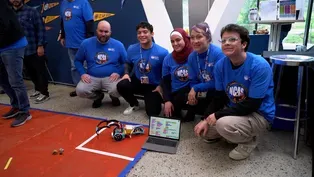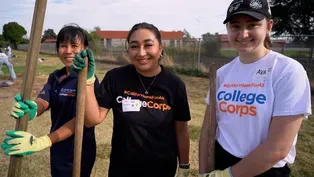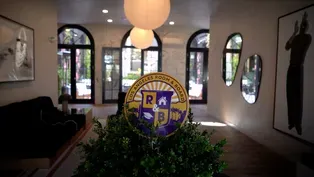Inside California Education
Umoja on Campus
Clip: Season 5 Episode 8 | 4m 55sVideo has Closed Captions
Discover how Umoja is creating community on community college campuses.
Discover how an organization called Umoja is creating community on community college campuses.
Inside California Education is a local public television program presented by KVIE
Funding for the Inside California Education series is made possible by the California Lottery, SchoolsFirst Federal Credit Union, Stuart Foundation, ScholarShare 529, and Foundation for the Los Angeles Community Colleges.
Inside California Education
Umoja on Campus
Clip: Season 5 Episode 8 | 4m 55sVideo has Closed Captions
Discover how an organization called Umoja is creating community on community college campuses.
How to Watch Inside California Education
Inside California Education is available to stream on pbs.org and the free PBS App, available on iPhone, Apple TV, Android TV, Android smartphones, Amazon Fire TV, Amazon Fire Tablet, Roku, Samsung Smart TV, and Vizio.
Providing Support for PBS.org
Learn Moreabout PBS online sponsorship♪♪♪ Dominique: Umoja is a community of students and scholars who believe in transformative education for African American students and other students, primarily in the California community college system.
But also, we identify as a global organization, and we are partnerships in the state of Washington and beyond.
Narr: Dominique serves as the chief communications and external affairs officer of Umoja located on community college campuses throughout California.
Umoja members say that being a part of this program gives students a sense of belonging, addresses educational barriers and helps students reach their full potential.
They say their goal is to educate the whole student body, mind and spirit.
Dominque: We live in a world where essentially every system is set up to fail our students and not just our students just to fail as people.
I think that the way that our academic system is set up, we have gone many years without being seen and so many people have struggled, whether they're getting AA degree or a four year degree or PHD or EDD, they've struggled and they've worked very hard in systems where they have not been seen at all.
Laurin: Umoja changed my college experience, because at times when I may have had a professor that weighed on me mentally, Umoja gave me a place where I could vent that out and refocus my attention on what the ultimate goal was.
And so if I go into a program that has no reflection of my own life experiences, how am I ever going to be able to see myself as someone that has value and can successfully be whoever that is?
Dominique: So on the average campus, where there is an Umoja program Umoja is the hub for African-American and other students.
In addition to that, we have a coordinator that's there on that campus that serves them, that provides them with tutoring, mentoring and other resources, connecting them to resources that are there on that campus.
There are also faculty members that specifically teach our Umoja students in a variety of disciplines.
Malik: I walked into the center, was greeted by a couple of Umoja workers there, and I was like, I just love the vibe in the center.
They had study rooms in the back.
I think just seeing, uh, excellence around and being in that environment, it kind of changed my perspective and brought the best out of me.
Narr: Umoja says it not only impacts students from the African diaspora, but it aims to foster a community environment for all students.
Laurin: So Umoja does not just impact or care about African-American students.
I remember telling people -- when they was like, “Can I be in Umoja I'm not...
I'm not black?
” you know, because that's how they said it.
And I was like, “we don't care if you're black, or not, you're can be any race you want to.
We care that you care about us as a people and a culture.
” Like, that's the goal.
Its not about displacing ourselves from others.
Dominique: So my philosophy is that all of us in some way or form come from the motherland, have been influenced by Africa.
We we have a shared culture here in the United States and where people are invited to better understand what black culture is, what African culture is.
And we're not an organization that discriminates because a lot of times people outside of our organization see how we build community and they want to... they want more of that.
They want to know how is it that they're transforming the way that students think about education in the classroom, but also engaging them culturally?
Speaker: We have to organize- Laurin: I would tell them that Umoja can really give you a chance to understand not only who you are, but why you are.
Dominique: Parents, and those who have influence over young people.
The thing that I would say is that when you are thinking about your child's educational future, do not underestimate the power of a community college.
Do not underestimate the power of that... that knowing that that student will walk into a campus where somebody cares for them, especially if there is a Umoja program there.
Aerospace Scholars: A NASA Learning Experience
Video has Closed Captions
Meet Bay Area students taking part in a unique NASA experience. (5m 50s)
College Corps: Reducing Debt through Community Service
Video has Closed Captions
See how California students can reduce their student loan debt through College Corps. (5m 7s)
From Homeless to Housed in Los Angeles
Video has Closed Captions
Community college students in Los Angeles go from homeless to housed. (6m 7s)
Providing Support for PBS.org
Learn Moreabout PBS online sponsorshipInside California Education is a local public television program presented by KVIE
Funding for the Inside California Education series is made possible by the California Lottery, SchoolsFirst Federal Credit Union, Stuart Foundation, ScholarShare 529, and Foundation for the Los Angeles Community Colleges.














